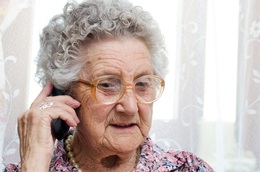England's social care ombudsman urges providers to scrutinise their complaints process
Domiciliary care complaint statistics have been published today for the first time by the Local Government Ombudsman (LGO), after experiencing a 14 per cent increase in complaints and enquiries.
Having taken on the responsibility for registered private care providers in 2009, the LGO has since had a 130 per cent increase in the number of complaints it receives, although the ombudsman does point out that the number of 2,456 complaints received in 2013 is still a relatively small considering an estimated 1.3m people in England rely on adult social care.
Accountability

Ombudsman Dr Jane Martin hopes the statistics and case studies available in today’s report will show providers the benefits of accountability, at the same time as reassuring service users that their complaints will be heard.
She comments: “Our complaints data suggests there is more to do to provide assurance about complaints handling.
“Over the last few years there have been a number of reviews that have looked at healthcare complaints. We must not wait for a crisis in adult care to examine more closely the way social care commissioners and providers deal with complaints.
“I hope that by publishing these statistics, I will encourage care providers to scrutinise their approach to ensure that the public are given a complaints process that is easy to access, effective and accountable.
“I also hope that by raising these issues more people will be aware of how to raise concerns and seek redress, and feel reassured that there is an independent ombudsman that they can turn to when providers fail to resolve complaints.” LGA response
A spokesman for the Local Government Association (LGA) has warned against treating today’s statistics as the complete picture, however:
“Whilst this report recognises that higher numbers of complaints does not indicate poorer services or less effective complaint handling, basing statistics exclusively on the number of complaints without consideration of how they are handled risks seriously misrepresenting what is accurately happening on the ground in local councils. In reality, 60 per cent of the authorities named in this report have below the average percentage of complaints upheld by the ombudsman.”

Although the LGA does agree that a rise in the number of complaints is not necessarily an indication of declining service quality, stressing that this “can be an indication that local authorities are making it easier for those in care to give feedback, and that people are confident that their council will act on it”.
On the role of local authorities the statement continues: “Councils have been working together with partners locally to improve the commissioning and quality of care and have been consistently arguing for improvements to the health and social care system on behalf of local people to make it sustainable for the twenty-first century. This means finding ways to address the social care funding crisis either by rearranging existing health and social care resources or putting more money into the system.”
Healthwatch England
Anna Bradley, chair of consumer champion Healthwatch England agrees and warmly welcomes today’s publication, saying: “It may seem counter intuitive but we should look on the increasing number of complaints as a good thing. It means that more people feel able to make their voices heard when the standard of care they receive from their carer or care home isn’t up to scratch.
“Providers of social care services, whether they be local authorities or private companies, need to learn to see complaints as a vital source of information to help them improve and ensure others don’t have to suffer the same poor standards in future.

“The Local Government Ombudsman is absolutely right to publish statistics for public and private providers and challenge them all to get their complaints handling processes right first time, so they can improve services without service users needing to reach for the ombudsman.
"We also need to make complaining easier for people. In particular, there needs to be an independent, unified and properly funded health and social care complaints advocacy service to provide practical support for those who don't have the confidence or determination to make their voices heard. And there needs to be some rationalisation of the more than 75 public and private organisations involved in dealing with complaints in health and social care."
Care Quality Commission
Andrea Sutcliffe, chief inspector of adult social care at the Care Quality Commission (CQC) also released a response to the report, saying: “I welcome today’s report which demonstrates how important it is for adult social care services to respond positively to the concerns that may be raised by people using these services or their family and friends.
“When we look at whether services are safe, caring, effective, responsive and well led we will be considering how well complaints are handled and acted upon. This will help to inform our judgement of whether services are outstanding, good, require improvement or inadequate.”
Latest News
 29-Jul-24
Dementia Bus gives carehome.co.uk staff insight into life with dementia
29-Jul-24
Dementia Bus gives carehome.co.uk staff insight into life with dementia
 01-Mar-24
Find out the top care homes in 2024
01-Mar-24
Find out the top care homes in 2024
 21-Mar-23
UK's top care homes in 2023 revealed
21-Mar-23
UK's top care homes in 2023 revealed
 03-Jan-23
carehome.co.uk launches free care helpline
03-Jan-23
carehome.co.uk launches free care helpline
 13-Dec-22
5 mins with Emily Whitehurst, chief operating officer for Constantia Healthcare
13-Dec-22
5 mins with Emily Whitehurst, chief operating officer for Constantia Healthcare